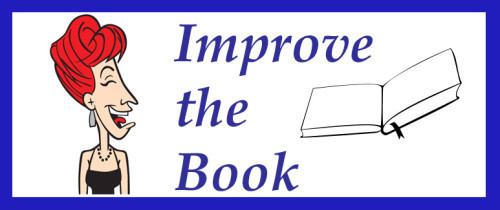P.A. Wilson's Blog, page 15
August 26, 2013
Manuscript review, the second step in creating a novel
I posted this video over on YouTube. It talks about how to start revision and how to avoid the ABSOLUTE rules that don’t really work. While I was putting it together, I realized there was a step missing. Manuscript review is really the first step.
Manuscript Review when does it start?
It’s tempting sometimes to want to jump into the manuscript review as soon as you’ve finished the first draft. This happens because of many things, but often the author is so excited about the story, they just want to keep working on it.
The best advice I can give is to put your draft aside for a while. You need distance to be able to see the gems and the weaknesses of the work. And there will be gems. And there will be weaknesses. How long? That depends. I work on more than one book at a time. Doing so allows me to get distance from the first draft in a couple of weeks. The new story takes it’s place at the front of my mind.
If you aren’t working on another book, you might need 6 weeks, you might need 3 months, before you can start your manuscript review with a fresh eye.
Manuscript review – what is it?
It’s the pre-revision work. You read the manuscript from the first word to the last. You don’t change anything, but you can make notes – note the great writing as well as the holes.
By putting aside the revision, you allow your mind to be more critical. When you have to think about how to fix something, your mind will be less diligent about finding weaknesses.
Your inner editor revels in the manuscript review stage. The voice that you silenced while writing the draft is your most powerful ally in finding what needs fixing.
If you want to learn how to write a book your way, check out my course by clicking on the image below.
The post Manuscript review, the second step in creating a novel appeared first on P. A. Wilson.
August 19, 2013
How to write a book | so many answers to a personal question
Learning how to write a book is not as easy as finding a list of tips and advice. It’s important to know how you write, not how others write. Courses on writing are helpful when you know what kind of writer you are. 
How to write a book – your way
When you start writing you may find that the act of putting words on a page is exciting until you get to around word 10,000 and now you don’t know what to do.
Is it okay for you to go back and make changes? Does that misplaced comma on page 12 matter? Will your hero ever start taking action?
Step one in the process of writing a book is to find out where you are on the scale of pantser to plotter.
Am I a pantser?
Do you like to explore a story as you write? If you know the ending, can you keep your excitement up while you create the middle of the story?
Pantsers like to discover the story the way a reader would. If they know what is supposed to happen, it gets hard for them to stay excited about the journey. A pantser will often just sit down and start writing without knowing anything but the germ of an idea.
Am I a plotter?
If you like to have a map of the story and then enjoy filling in the details of that map, you may be a plotter. You like to know what’s happening in the next scene, or chapter and then you play with how the characters react to the situations. You might be open to learning something about your story, or characters, but you might want to be in control of the story completely.
What’s the best way?
My advice on how to write a book, is to find your process and honor it. There is no right way, no best way. There are genre conventions and tips and advice about how to write a book, but anyone who says they know the right way is misleading you.
If you have that book inside you, and want to learn how to write a book by aligning with your own style, check out the course below.
The post How to write a book | so many answers to a personal question appeared first on P. A. Wilson.
August 12, 2013
Critique services | finding the right advice
As an author it’s important to understand what services you need before you either publish or submit your great novel. Critique services are one of the first of the services you need to engage – even before you finish the book, you need a second opinion.
What is a book critique?
There are several names for this step and it’s important to know what you are getting when you engage someone to critique your work. It’s even more important to know what you are getting if you share critiques with a partner.
A critique provides the following three benefits. There are more, but these are the basics.
Benefit #1 A fresh eye on the work. This is critical because you are probably going to be too close to the story to see the problems. And there are always problems.
Benefit #2 Clear indications of why something doesn’t work. When you need a critique, you need to know more than just ‘there’s a problem’. A good critique service will tell you more than just ‘I didn’t care for your hero’.
Benefit #3 Advice from someone who knows writing. This is important! It’s helpful to hear that your pacing is off, but it’s more helpful when another writer tells you, “Maybe you can cut this scene, or maybe you need to break up your paragraphs.”
Critique services: to pay, share, or get free
Free: There are several places online to get critique services. Sometimes you can find a great critique partner online, and sometimes you get what you paid for. I encourage people to look for sites like Ladies who Critique and give it at try.
Here’s my experience. I gave a few detailed critiques and got one back that had 3 short comments. The person may have thought they were being kind, but kind doesn’t cut it when you are trying to make your story the best it can be. That’s not to say you need to be unkind. Critiques are given with respect and truth.
Shared: Groups who provide critiques to member writers can be found at Meetup, or through writing associations. These groups are usually great for getting detailed feedback and you will be working with other authors.
Here’s my experience: I had a great writing group that I worked with for a couple of years. The reason I left was purely selfish. I needed faster turnaround – most of these writing groups will review a set number of pages each time. And, I didn’t have time to read and provide critiques in return. Remember it’s a shared experience. You will be doing a critique for the other writers too.
Paid: There are numerous people online who will provide paid critique services. The trick is to make sure they are providing the service you need. An edit is not a critique, but a story edit is probably a critique.
Here’s my experience: I now engage paid critiques when I can find someone with a hole in their schedule. I’ve had great feedback from paid critique services, and I’ve also been disappointed to find I have to join a waiting list that is months long.
Good luck with your writing.
If you are looking for a paid critique of your writing, click on the picture to learn how I can help.
The post Critique services | finding the right advice appeared first on P. A. Wilson.
August 5, 2013
How to become a writer | tips on releasing the book inside you
One of the ways to find out how to become a writer is to explore the way books get written. There are online courses and books galore about learning to write, but what they don’t help you learn is how YOU become a writer.
How to become a writer – the writer YOU have inside
The key to becoming a writer is to learn how you write. Studying books on structure and style and plot and character development will deepen your understanding of the theory of writing.
Theory is great when you come to revise your book, but the secret most writers know is you aren’t a writer until you put words on a page. The trick to doing that is to stop expecting your first draft to be perfect.
A book on the page can be fixed, a book in your head can’t
The secret to getting the book on the page is to silence that voice inside that tells you that you are a lousy writer. We all hear the inner editor. No matter how many books they’ve written or how successful they are, every author is critical of their own work.
Becoming a writer requires you to write. That sounds pat, but sometimes writing is the hardest part for new authors.
How to silence the voice – at least until it’s needed
Two skills help to silence your inner editor.
Learn your process means working out your first draft approach. Are you a plotter who puts the framework together before drafting the story, or a panster who sits down and writes by the seat of their pants?
If you try to write in a style that isn’t comfortable, you leave all kinds of openings for the inner editor to point to problems.
Give the inner editor a reason to trust you can be as simple as agreeing with it. If you don’t argue with the voice, it loses power over you. If the voice isn’t undermining your confidence, you can just write.
If you want to learn how to become a writer, click on the image below.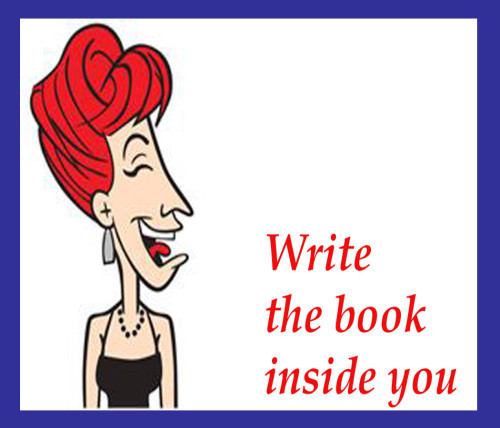
The post How to become a writer | tips on releasing the book inside you appeared first on P. A. Wilson.
July 5, 2013
Grammar, it’s about being understood, right?
This video from Stephen Fry came to my attention this week. It’s worth a listen – after all, it’s Stephen Fry. The question of correctness in grammar is always hot in the author world. I think it’s important to have some care for the story above the care for the grammar.
Grammar, for me it’s about being understood
I read a lot and I notice that there are errors of grammar in traditionally published books as well as in self published books. I’ve made a few gaffes myself and had to upload a corrected version of the manuscript. What interests me is the way the story can pull me through despite the grammar errors.
If I stop reading a book, it’s more likely because of lacks in the story than a misplaced comma. For grammarians, or grammar Nazis as they have come to be known, any deviation from proper writing is a sin worthy of eternal damnation.
Grammar isn’t cut and dried
There are rules of English that are taken as gospel when they aren’t. Did someone split an infinitive? It’s not wrong to do so. Too often writers are slammed for grammar errors when they are using the language correctly. And just as often the sin is a pet peeve, rather than a real error of grammar.
The English language lives and breathes on usage. As Stephen says, we’ve been verbizing nouns at least since Shakespeare. Getting upset about it doesn’t help anyone.
If it’s dialogue it’s not going to be correct
It’s possible that grammarians speak in properly constructed sentences but most people don’t. Authors who try to make that happen end up with wooden and unrealistic sounding characters. Fiction is not like a cover letter, or a resume, it’s supposed to sound real, not correct.
So that’s my little rant. What do you think? Is grammar supreme?
Enjoy mysteries? For Charity Deacon, a private investigator with a nose for trouble, curiosity is just a way of life.
Like wizards in trouble? Quinn Larson is a wizard. His life in the shadow world of the Vancouver Real Folk is a quiet one, and he’d prefer if it stayed that way.
Time for a romantic fantasy? The prophecy that will save them rests on her decisions, but can Madeline accept her new purpose in a place so far beyond everything she’s ever known?
Don’t care for series? Mystery, Science Fiction and more to come.
The post Grammar, it’s about being understood, right? appeared first on P. A. Wilson.
June 28, 2013
Books online, do you have a favorite place to buy?
There are a multitude of places to buy books online. People seem to have their favorites and I’ve been interested in why one site is preferred. I gathered some answers to ‘why do you prefer to buy books online from X’.
The first point – what does buying books online mean?
Lately, I’ve noticed a few old subjects are surfacing. The fact that you buy a license not a ‘real’ book when you get an ebook – yes, it’s true. The ‘what if my Kindle, Kobo, Sony Reader, Nook, or laptop crashes? I’ll lose all my books’ – nope. All legitimate sites keep a record of what you’ve bought and you can just download them again.
Buying physical books online is the same as buying them in the bookstore – except for a bit of a delay in delivery.
The answers to why people prefer some sites over others
Admittedly it wasn’t a scientific survey, and there are only a couple of answers, but there’s a theme. I buy books online from Amazon, Kobo, Smashwords, because I like the way it works.
Amazon, still the biggest place to buy books online, or anything else for that matter, is a one click purchase site. If you have a Kindle, or use the Kindle reader app, it’s the easiest path from see a book to read a book.
Kobo, getting better all the time. The process is a bit more clunky to get your book onto the reader, but it’s not too hard. They use epub, so the book is compatible with other readers and they have a good selection. The downside as I have experience Kobo is their search engine isn’t all that reliable.
Smashwords, a huge on online ebook distributor. This is a great place to get free books online. The books are mostly self publishers and you can find some interesting reads. The books are epub, and are compatible with most ereaders (not Kindle because Amazon uses .mobi). You need a separate reading application, but those are free, so no problem.
So where do you get your books online?
Enjoy mysteries? For Charity Deacon, a private investigator with a nose for trouble, curiosity is just a way of life.
Like wizards in trouble? Quinn Larson is a wizard. His life in the shadow world of the Vancouver Real Folk is a quiet one, and he’d prefer if it stayed that way.
Time for a romantic fantasy? The prophecy that will save them rests on her decisions, but can Madeline accept her new purpose in a place so far beyond everything she’s ever known?
Don’t care for series? Mystery, Science Fiction and more to come.
The post Books online, do you have a favorite place to buy? appeared first on P. A. Wilson.
June 21, 2013
Villains, why do we love them?
Villains drive the story. Without someone in the way, the hero has no challenges. Without challenges there is no story. Why do we love some of our villains and hate others?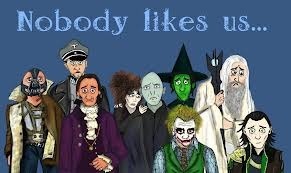
The role of villains
In a story, the villain isn’t always the bad guy. The villain is the character who gets in the way of the hero. They have goals that conflict in so strongly that only one of them can win. The character who wins the conflict is the hero.
The cool thing about this is that the hero doesn’t have to be wrong about their goal. In romance we see this situation often. The villain is the mother who knows what’s best for her daughter or son. The conflict is about the child wanting a different future.
Why do we sometimes love them, or feel sorry for them?
If an author has done a great job with the villain, we feel emotions about them other than hate. Villains are always the hero of their own story, that is what makes them fascinating.
In the case of the Harry Potter series, I was amazed by the treatment of Professor Snape. I know that the target reader saw him differently from the way I saw him, but I always knew he wasn’t the villain that he was painted. The reason? He had too much depth. And then it was revealed that he was on Harry’s side, he didn’t turn into a nice guy. The best of villains stay true to themselves.
Who is your favorite villain?
Enjoy mysteries? For Charity Deacon, a private investigator with a nose for trouble, curiosity is just a way of life.
Like wizards in trouble? Quinn Larson is a wizard. His life in the shadow world of the Vancouver Real Folk is a quiet one, and he’d prefer if it stayed that way.
Time for a romantic fantasy? The prophecy that will save them rests on her decisions, but can Madeline accept her new purpose in a place so far beyond everything she’s ever known?
Don’t care for series? Mystery, Science Fiction and more to come.
The post Villains, why do we love them? appeared first on P. A. Wilson.
June 14, 2013
Time is finite, what you do with it is up to you
Time is finite, but different for everyone. While you might not know how much time you have in the rest of your life, you know how much you have today. Lately people have been asking me how I find the time to do everything I have on my plate. It’s an interesting question because there’s no magic answer, but there is a great set of tools you can use to improve.
Time is manageable
The tips are easy to implement and don’t take hours to learn. I’ve developed an online course to help you understand the process, and give you the tools to make the most of your time.
Because time is finite, it’s all about how you prioritize your use of it.
Because time is finite,
your ability to prioritize is the key to making the most of it.
It doesn’t matter what you are trying to juggle, setting priorities will make sure that the important things get done. Is writing your book the most important thing on your list? Is it the least? If the answer to the questions is least, no wonder you don’t get any time to do it.
Three tips to manage your priorities
figure out how many hours you have in your week
list the things you must do
pick the priorities of what you want to do
An example
Let’s see what the three things might look like on your calendar.
Figure our how many hours you have in your week:
Everyone has 24 hours in each day. How long do you need to sleep? Let’s say you get 8 hours a day (sounds like a great goal) 24-8 = 16.
You have 16 hours to do everything every day.
List the things you must do:
Do you have kids? how many hours do you drive them around? How long do you work? Do you have a yoga class? Do you make dinner and other meals? Deduct the time from your schedule and lets say you have 4 hours to yourself every day.
Pick the priorities of what you want to do
What is on that list of things you want to accomplish? Is it writing? Are there twenty things on the list? To prioritize them think about how long you want to devote to each item. If you have 4 hours, can you write that long every day? How about that painting class you want to sign up for? What about training for a marathon?
The secret I’ve found for this is only schedule 75% of the time you have. There are too many things that steal a few minutes here and there that you really don’t have a full four hours.
Time is finite, but some people do more with their time than others. Good luck with managing your time.
The post Time is finite, what you do with it is up to you appeared first on P. A. Wilson.
June 5, 2013
Unlikeable characters
Unlikeable characters can carry a story better than a likeable character. There’s something about following them through the story that interests us. 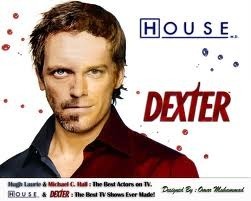
What makes an unlikeable character?
I think this is different for everyone. The fact that some people like stories I don’t is proof of that. For the most part, there are two characteristics that make a character unlikeable to me. They are narcissistic and they use people – these are two different characteristics.
Unlikeable characters, the balance
Let’s talk about two unlikeable characters, Dexter and House.
Dr. House is narcissistic to the extreme. He doesn’t seem to understand the concept that people have their own needs and goals. He doesn’t just tell the bald truth, he does it in such a way that it hurts more than it needs to. The balance is that he is effective in diagnosing, and in using his team to diagnose, odd but deadly diseases. The end result – most of the time – is a life saved.
Dexter is a serial killer. He doesn’t simply kill, he tortures and he gets pleasure from his victim’s terror and pain. The balance for this character is that he only kills serial killers and he helps to take them off the street.
It’s a matter of taste
I found Dr. House entertaining but I only watched one episode of Dexter. The reason is that Dr. House’s end result was saving lives. When he didn’t save the life, he stayed true to character. He seemed to care, but it was about the disease, not about the person. He was affronted by the fact that the puzzle beat him.
Dexter, doesn’t stay true to character. He’s a sociopath, but he cares about his sister. That’s a character break for me. If there are no killers around for him to torture, would he find other victims?
The post Unlikeable characters appeared first on P. A. Wilson.
June 3, 2013
Caper stories, what makes them interesting?
Caper stories are fun entertainment. The Danny Ocean franchise does it well because they show us everything and then still fool us with the action.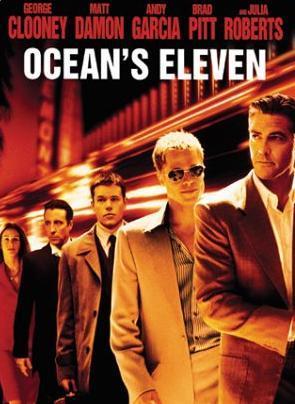
The caper story conventions
One of the weird things about caper movies is that they break the usual rules. They show us everything that is going to happen and then they show it happening as everything goes wrong.
There are a few that go dark, where everything does go wrong, or there’s a twist of revenge that taints it. For the most part, the caper tends toward the comedic side of the scale.
Why I think it works
The big thing for me in caper movies is the feeling of being on the team. When Danny Ocean explains the job and we watch the walk-throughs, I’m in the room and involved in the planning. In the back of my head is the voice saying, ‘it’s going to go pear shaped’, but I still want them to succeed.
Then the action starts and I know there are things happening behind the scenes, but by now I’m on the side of the criminals. The caper is about getting justice, whether we know it or not up front, and I’m all for justice.
When the real reveal happens
Now is the point where the story can break. The reader or viewer can be entertained by the caper reveal, or can be left feeling like the victim. If the reveal is good, I am going to laugh along with the team as they show me how they created the illusion of problems. If the reveal is bad, I’ll feel tricked and I won’t go further.
The characters in a caper movie are the key. Everyone needs to be competent in their role, but have a quirk or flaw. The story takes the quirks and flaws as fodder for the failures. Then the strengths of other team members come into play to keep the caper on track.
The post Caper stories, what makes them interesting? appeared first on P. A. Wilson.

